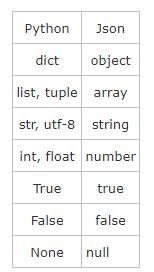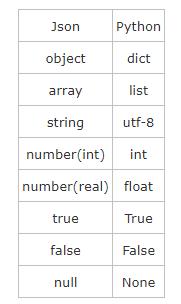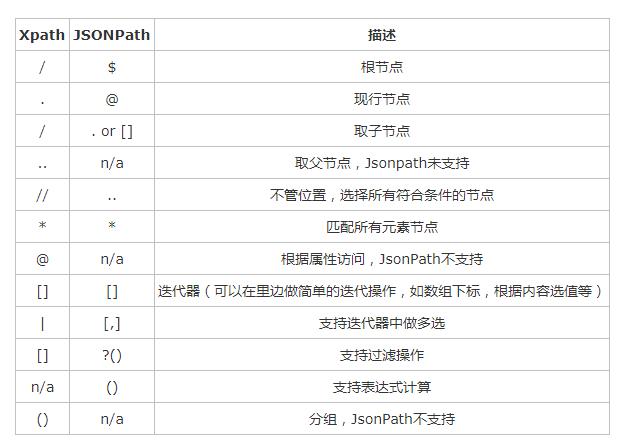Json与JsonPath
Posted niansi
tags:
篇首语:本文由小常识网(cha138.com)小编为大家整理,主要介绍了Json与JsonPath相关的知识,希望对你有一定的参考价值。
JSON(javascript Object Notation)是一种轻量级的数据交换格式,因为它良好的可读性与易于机器进行解析和生成等特性,在当前的数据整理和收集中得到了广泛的应用。
JSON和XML相比较可谓不相上下。
Python 2.X中自带了JSON模块,直接import json就可以使用了。
官方文档:http://docs.python.org/library/json.html
Json在线解析网站:http://www.json.cn
JSON
json简单来说就是JavaScript中的对象和数组,所以这两种结构就是对象和数组两种结构,通过这两种结构可以表示各种复杂的结构。
对象:对象在js中表示为{ }括起来的内容,数据结构为{key1: value1, key2:value2, ...}的键值对的结构,在面向对象的语言中,key为对象的属性,value为对应的属性值,所以很容易理解,取值方法为 对象.key 获取属性值,这个属性值的类型可以是数字、字符串、数组、对象。
数组:数组在js中是[ ]括起来的内容,数据结构为[\'Python\', ‘JavaScript\', \'C++\', ...],取值方式和所有语言一样,使用索引获取,字段值的类型可以是数字、字符串、数组、对象。
json模块
json模块提供了四个功能:dumps、dump、loads、load,用于字符串和Python数据类型间进行转换。
1.json.dumps()
实现Python类型转化为Json字符串,返回一个str对象,从Python到Json的类型转换对照如下:
# -*- conding:utf-8 -*-
import json
listStr = [1, 2, 3, 4]
tupleStr = (1, 2, 3, 4)
dictStr = {"city": "北京", "name": "蚂蚁"}
print(json.dumps(listStr))
# [1, 2, 3, 4]
print(type(json.dumps(listStr)))
# <class \'str\'>
print(json.dumps(tupleStr))
# [1, 2, 3, 4]
print(type(json.dumps(tupleStr)))
# <class \'str\'>
# 注意:json.dumps() 序列化时默认使用的ascii编码
# 添加参数 ensure_ascii=False 禁用ascii编码,按utf-8编码
print(json.dumps(dictStr, ensure_ascii = False))
# {"city": "北京", "name": "蚂蚁"}
print(type(json.dumps(dictStr, ensure_ascii = False)))
# <class \'str\'>
2.json.dump()
将Python内置类型序列化为Json对象后写入文件
# -*- conding:utf-8 -*-
import json
listStr = [{"city": "北京"}, {"name": "蚂蚁"}]
json.dump(listStr, open("listStr.json", "w", encoding = "utf-8"), ensure_ascii = False)
dictStr = {"city": "北京", "name": "蚂蚁"}
json.dump(dictStr, open("dictStr.json", "w", encoding = "utf-8"), ensure_ascii = False)
3.json.loads()
把Json格式字符串解码转换成Python对象,从Json到Python的类型转换对照如下:
# -*- conding:utf-8 -*-
import json
strList = \'[1, 2, 3, 4]\'
strDict = \'{"city": "北京", "name": "蚂蚁"}\'
print(json.loads(strList))
# [1, 2, 3, 4]
# json数据自动按utf-8存储
print(json.loads(strDict))
# {\'city\': \'北京\', \'name\': \'蚂蚁\'}
4.json.load()
读取文件中Json形式的字符串,转换成Python类型
# -*- conding:utf-8 -*-
import json
strList = json.load(open("listStr.json", "r", encoding = "utf-8"))
print(strList)
# [{\'city\': \'北京\'}, {\'name\': \'蚂蚁\'}]
strDict = json.load(open("dictStr.json", "r", encoding = "utf-8"))
print(strDict)
# {\'city\': \'北京\', \'name\': \'蚂蚁\'}
JsonPath
JsonPath是一种信息抽取类库,是从JSON文档中抽取指定信息的工具,提供多种语言实现版本,包括:JavaScript、Python、php和Java。
JsonPath对于JSON来说,相当于XPATH对于XML。
下载地址:https://pypi.python.org/pypi/jsonpath
安装方法:下载后解压之后执行 python setup.py install
官方文档:http://goessner.net/articles/JsonPath
JsonPath与XPath语法对比:
JsonPath结构清晰,可读性高,复杂度低,非常容易匹配,下表中对应了XPath的用法。

示例:
以拉勾网城市JSON文件:http://www.lagou.com/lbs/getAllCitySearchLabels.json 为例,获取所有的城市名称。
# -*- conding:utf-8 -*-
import urllib.request
import json
import jsonpath
# 拉勾网城市JSON文件
url = \'http://www.lagou.com/lbs/getAllCitySearchLabels.json\'
# User-Agent头
header = {\'User-Agent\':\'Mozilla/5.0 (Windows NT 6.1; WOW64) AppleWebKit/537.36 (KHTML, like Gecko) Chrome/39.0.2171.71 Safari/537.36\'}
# url 连同 headers,一起构造Request请求,这个请求将附带 chrome 浏览器的User-Agent
request = urllib.request.Request(url, headers = header)
# 向服务器发送这个请求
response = urllib.request.urlopen(request)
# 获取页面内容:bytes
html = response.read()
# 转码:bytes转str
html = html.decode("utf-8")
# 把json格式字符串转换成python对象
obj = json.loads(html)
# 从根节点开始,匹配name节点
city_list = jsonpath.jsonpath(obj, \'$..name\')
# 打印获取的name节点
print(city_list)
# 打印其类型
print(type(city_list))
# 写入本地磁盘文件
with open("city.json", "w", encoding = "utf-8") as f:
content = json.dumps(city_list, ensure_ascii = False)
f.write(content)
以上是关于Json与JsonPath的主要内容,如果未能解决你的问题,请参考以下文章